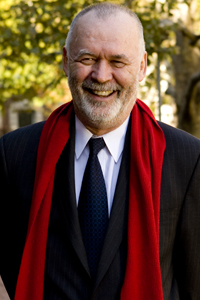His students may not be anything like Gordon Gekko, the ruthless antagonist of the film Wall Street. But Raymond Horton, the director of the Social Enterprise Program at Columbia Business School, says CSR- and sustainability-focused MBA grads will still be in demand in a tough economy.
How will the current financial turmoil affect the corporate social responsibility branch? I imagine that companies that have to make job cuts might look here first.
To the extent that CSR units are located in the public relations parts of businesses, you might be right. But I think there has been a sea change here. Most people from Columbia Business School who want to be social enterprisers and practice corporate social responsibility are going into operating divisions, and incorporating CSR into the basic routines and policies of the organizations. So they’re not going to get displaced. It’s just another way of saying that CSR has become a profit center in a lot of businesses.
Is now the the right time to get an MBA in this branch?
I don’t know what the experience is at other schools, but I know our applications are up over 25 percent this year. I think a lot of people figure this is a good time to get an MBA. For somebody who came out of college and went to work on Wall Street or management consulting for four or five years, if they figure they are going to get an advanced degree at some point – and maybe they’ve just gotten laid off, or they think they’re going to get laid off or not going to get a salary increase – it becomes a good time to go to school.
When did businesses really start becoming interested with sustainability and social engagement?
We’ve had an explosive growth in student interest at the Columbia Business School in the last seven or eight years, and people always ask me why. Part of the reason is that we’ve developed a good program, so we tend to draw students because of that. I also think this is a secular trend in business schools, generally.
A lot of it has to do with the environment. Business school students are completely aware of the fact that they can’t do “business as usual” throughout their careers. I think the corporate scandals had a little bit to do with it, but business school students are generally more attuned to the needs of their society and environment than they used to be. There aren’t many Gordon Gekkos walking the halls of Columbia Business School.
What do students focus on in the Columbia Social Enterprise program?
We have four major areas of student interest: non-profit, social entrepreneurs, CSR, and international development. Our strategy has been to develop three or four courses in each area. There’s a lot of overlap, and the areas are not clearly defined, so you take students that are interested in non-profit might be interested in some of the social entrepreneurship courses and vice versa. We actually have larger average enrollments courses in our social enterprise courses than the regular finance, marketing, and operations courses. We have to cap our enrollment in a lot of these courses.
(Photo: Columbia Business School)

I am a Columbia University alumnus. Professor Horton rightly says that business graduates who want to be social enterprisers are now entering operating units at business organizations. I am originally from Pakistan, where we cannot afford any economic development without sustainability. Especially in those areas where cultural and environmental considerations are to be given priority, we need a storng CSR element for economic development.
Munir Kazmi
Chairman
Department of International Relations
Karakoram International University
Gilgit, Northern Pakistan